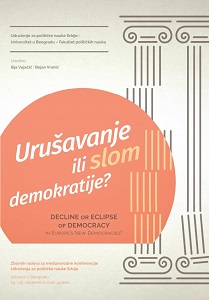Izbori 2016. godine i (totalni?) poraz autonomaške ideje u Vojvodini
2016 Election and (Total?) Defeat of Autonomist Idea in Vojvodina
Author(s): Duško Radosavljević
Subject(s): Electoral systems, Political behavior, Politics and society
Published by: Fakultet političkih nauka Univerziteta u Beogradu
Keywords: Political parties; Vojvodina; Autonomism; 2016 Election
Summary/Abstract: During more than 25 years of pluralistic party system existing in Serbia and in Vojvodina, a large number of parties and non-government organizations, which put Vojvodina’s position and its improvement in the focus of their acting, have been formed. Over time, parts of these efforts have been taken over by the parties that were formed outside of Vojvodina,, achieving better election results than the “original autonomists”, while diluting those views, they also legitimized them in political struggles. The second group, parties of national communities in Vojvodina, once natural allies to autonomist options, has also joined this process, achieving their particular interests by ignoring and bypassing provincial interests. The third group, parties – deniers of regional particularities have been ambivalent about the question of the province from the beginning of the multiparty system in Serbia/Vojvodina – in the opposition they seek reduction of the rights of Vojvodina,, if they are in power, they try to at least bureaucratically increase the level of competence, in order to efficiently exploit provincial resources (public enterprises, institutions and companies), strengthen personal position within the party and finance their parties. 2016 elections were held in such an environment. Democratic/liberal/civic option has emerged in several columns, with a set of unrealistic goals, parties of national communities with the desire to recognize the winning side, the third group with the intention to strengthen the monopoly position of state-level by installing the provincial government and minor Vojvodina’s options to acquire citizenship rights. In a political fight without advocacy for clear political objectives, which has been reduced to questioning what amount of power should the ruler be showered by and not understanding what goal of the election is, democratic parties’ options, especially those with autonomist and national precursors, have easily given up the efforts to amend the status of Vojvodina. For a longer period of time the autonomist idea has been defeated. Whether it is fatal or not is the theme of this article.
Book: Urušavanje ili slom demokratije
- Page Range: 241-255
- Page Count: 15
- Publication Year: 2016
- Language: Serbian
- Content File-PDF

